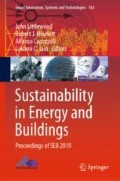Abstract
This paper presents an approach to define and implement a ‘Zukunftsquartier’ (future neighbourhood) in the context of the densely populated city environment of Vienna, which is in line with the national energy targets 2050. The ‘Zukunftsquartier’ project explores the feasibility of plus energy neighbourhood concepts at four prospective project sites in Vienna. The case studies evaluate the potential of demand side management, innovative renewable energy systems including photovoltaic and near-surface geothermal energy by hourly energy balancing and are compared for the Austrian building code and ‘passive house’ construction standards. Due to the high floor space index of urban projects, all investigated concepts failed to achieve a positive energy balance, except theoretical variants with unfeasibly high PV utilization of virtually the entire roof and façade surfaces. To offset the unintended effect of plus energy being harder to achieve in a dense urban context, we propose a correction factor for the target energy balance of ‘plus energy’ buildings and neighbourhoods based on the floor space index. Together with a second energy balance adjustment, reflecting the prospective renewable energy system (RES) of Austria 2050, most ambitious variants (utilizing ground heat and moderate PV surfaces) achieved ‘plus energy’ standard for dense urban areas and life cycle costs compared to conventional realizations within 30 years.
Access this chapter
Tax calculation will be finalised at checkout
Purchases are for personal use only
References
Alham, M.H., Elshahed, M., Ibrahim, D.K., Abo El Zahab, E.E.D.: A dynamic economic emission dispatch considering wind power uncertainty incorporating energy storage system and demand side management. Renew. Energy 96, 800–811 (2016). https://doi.org/10.1016/j.renene.2016.05.012
Fellner, M., Zelger, T., Leibold, J., Huemer-Kals, V., Kleboth, A., Granzow, I., Fleischhacker, A.: Smart City MIKROQUARTIERE. Vienna (2018)
Gollner, C., Hinterberger, R., Noll, M., Meyer, S., Schwarz, H-G.: Booklet of positive energy districts in Europe. Preview (2019)
Iturriaga, E., Aldasoro, U., Terés-Zubiaga, J., Campos-Celador, A.: Optimal renovation of buildings towards the nearly Zero Energy Building standard. Energy, 160, 1101–1114 (2018). https://doi.org/10.1016/j.energy.2018.07.023
Jensen, S.Ø., Marszal-Pomianowska, A., Lollini, R., Pasut, W., Knotzer, A., Engelmann, P., Reynders, G.: IEA EBC annex 67 energy flexible buildings. Energy Build. 155, 25–34 (2017). https://doi.org/10.1016/j.enbuild.2017.08.044
Koutra, S., Becue, V., Gallas, M.-A., Ioakimidis, C.S.: Towards the development of a net-zero energy district evaluation approach: a review of sustainable approaches and assessment tools. Sustain. Cities Soc. 39, 784–800 (2018). https://doi.org/10.1016/j.scs.2018.03.011
Österreich, E.E.: Energiewende 2013 – 2030 – 2050 (2015)
Partoll, M.: +ERS Plusenergieverbund Reininghaus Süd, Endbericht (2016)
Schneider, S., Bartlmä, N., Leibold, J., Schöfmann, P., Tabakovic, M., Zelger, T.: New system boundaries! Abolishing the efficiency paradigm. RealCorp Paper (2019)
Wu, J., Zhang, B., Jiang, Y., Bie, P., Li, H.: Chance-constrained stochastic congestion management of power systems considering uncertainty of wind power and demand side response. Int. J. Electr. Power Energy Syst. 107, 703–714 (2019). https://doi.org/10.1016/j.ijepes.2018.12.026
Acknowledgements
The authors thankfully acknowledge the Austrian Research Promotion Agency (FFG) and the Austrian Federal Ministry of Mobility, Innovation and Technology for enabling this publication by funding the research project ‘Zukunftsquartier’ in the research programme ‘Stadt der Zukunft’.
Author information
Authors and Affiliations
Corresponding author
Editor information
Editors and Affiliations
Rights and permissions
Copyright information
© 2020 Springer Nature Singapore Pte Ltd.
About this paper
Cite this paper
Leibold, J. et al. (2020). ‘Zukunftsquartier’—On the Path to Plus Energy Neighbourhoods in Vienna. In: Littlewood, J., Howlett, R., Capozzoli, A., Jain, L. (eds) Sustainability in Energy and Buildings. Smart Innovation, Systems and Technologies, vol 163. Springer, Singapore. https://doi.org/10.1007/978-981-32-9868-2_17
Download citation
DOI: https://doi.org/10.1007/978-981-32-9868-2_17
Published:
Publisher Name: Springer, Singapore
Print ISBN: 978-981-32-9867-5
Online ISBN: 978-981-32-9868-2
eBook Packages: Intelligent Technologies and RoboticsIntelligent Technologies and Robotics (R0)

